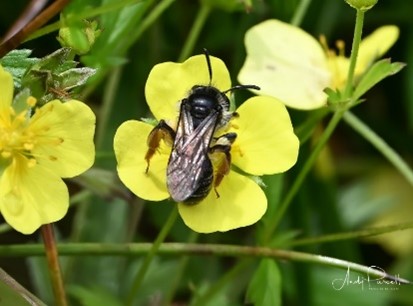Walsall Council reflects on successful bee conservation efforts for World Bee Day
Published on
In celebration of World Bee Day on Monday 20 May, an annual event dedicated to raising awareness about the vital role of bees and other pollinators in our ecosystems, Walsall Council reflects on the significant progress made in the preservation of bees across the borough.

Over the past 20 years, Walsall Council has spearheaded habitat restoration work at Barr Beacon, in collaboration with Natural England. This initiative has recently led to the presence of two ‘near-threatened’ bee species, the Cats Ear Mining Bee (Andrena humilis) and the Cats Ear Nomad Bee (Nomada integra). These species were rediscovered by Aaron Bhambra, a researcher at the University of Birmingham, marking the first local sighting in decades.
The restoration of heathland at Barr Beacon is part of the larger Purple Horizons Nature Recovery Project, supported by Defra and Natural England. This project aims to create nature-rich landscapes between Sutton Park and Cannock Chase, providing essential habitats for bees and other varieties of species.
Diggers have removed vegetation from the sites in Walsall and Lichfield, which are all remnants of a vast heathland landscape. The freshly dug earth is designed to make space for bees and wasps to nest and provide suitable habitat for a range of species that use heathlands, such as common lizards. One such threatened species is the tormentil mining bee which was once thought to be locally extinct but was rediscovered at Chasewater in 2022 and Brownhills Common this year. The tormentil mining bee, which is listed as a Priority Species in England, digs nesting burrows in soft soil banks or ‘beaches’. They feed their young almost exclusively on the pollen of tormentil, a rare wildflower that grows on acidic sandy soils.
In addition to these efforts, Walsall Council has committed to rewilding initiatives that directly support biodiversity and bee populations. The 'Rewilding Walsall' project focuses on transforming traditional green spaces into vibrant havens for bees and other pollinators. By expanding grassland, heathland, wildflower, and tree cover across the borough, these initiatives provide essential habitats and food sources for bees, crucial for their survival and pollination activities. A key aspect of this project is changing grassland management practices to allow grass to grow longer and reduce mowing, creating optimal conditions for bees to thrive. Maintenance will occur in late summer or early autumn to allow wildflowers to set seed, further promoting bee-friendly environments over time.
“ We are immensely proud to celebrate World Bee Day, recognising the crucial role of bees in our ecosystems. Our ongoing efforts in Walsall, from rewilding initiatives to heathland restoration projects, are not just about the present; they are investments in a sustainable future for generations to come. As we reflect on the thriving bee populations at Barr Beacon and across our borough, we reaffirm our commitment to environmental stewardship. These initiatives are not only enhancing biodiversity but also providing vital habitats for threatened species like the Cats Ear Mining Bee and Nomad Bee. By prioritising environmental conservation, we are not just protecting bees; we are safeguarding the health of our planet for all inhabitants. “
Ends